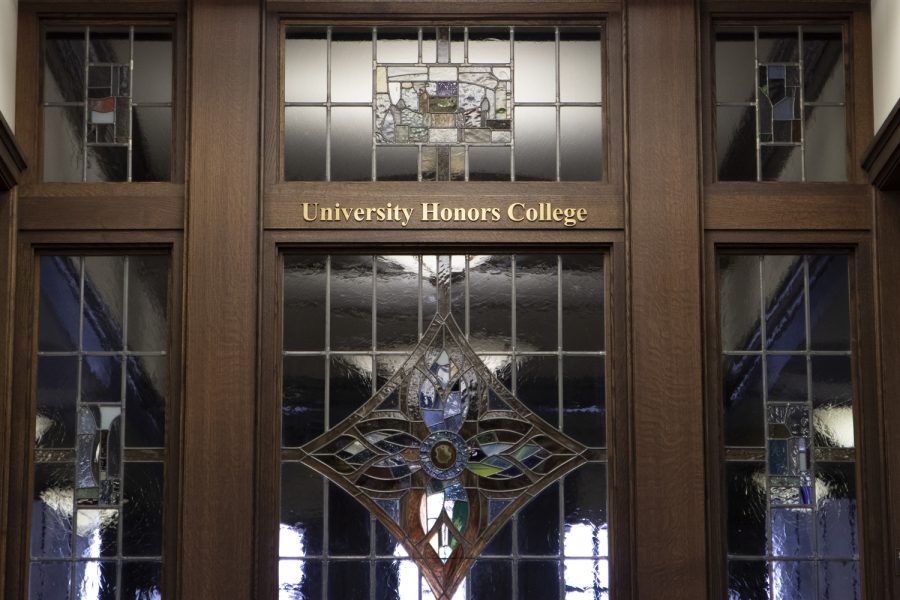Pittsburgh Undergraduate Review revival gives undergraduate researchers visibility
Caela Go | Senior Staff Photographer
The University Honors College in the Cathedral of Learning.
January 19, 2022
With the return to in-person research work last semester, the revival of the Pittsburgh Undergraduate Review journal is giving Pitt students a chance to showcase their research to the public.
The Review allows undergraduate students to publish their own research or creative work. The first issue came out at the start of the fall semester last year, marking the official rebirth of the journal, and the second issue will come at the end of the spring semester.
Brett Say, the University Honors College’s director of research and creative programs, oversees the Review’s operations. According to Say, the journal is open to student work across a variety of majors and study backgrounds.
“The journal is completely interdisciplinary, taking submissions from students in any major or field, and is peer reviewed,” Say said. “Editorial board members go through a peer review training which I, the ULS and the Honors College have designed and supported.”
Say said the journal is sponsored by the Honors College and is a collaboration with the University Libraries System’s Open Journal System. According to Say, the journal has an extensive history at Pitt, but there are gaps in its publication.
“The journal has a long history with the University, and was started over 30 years ago, although there was a period of years when the journal was inactive,” Say said.
Jolie Haertter, a sophomore psychology and law, criminal justice and society major, was recently featured in the Review. Their research was completed in high school, and peer-reviewed during their first year at Pitt and centers on social justice issues. Haertter also serves as the graphic designer for the journal.
“I have a passion for research in psychological bias in social justice issues,” Haertter said. “My research is about how children with general disabilities developed in their gender biases through categorizing toys and clothing items as for girls, boys or both.”
Haertter added that seeing other students’ work has been inspiring, especially because of the journal’s emphasis on featuring research from multiple areas of studies.
“I really feel like publishing and sharing research with other students strengthens the research itself,” Haertter said.
Daniel Turillo, a junior political science and economics major, said he was informed about the Review’s return through connections in the Honors College. He was just completing his research when the submissions for last fall’s issue opened.
“I was super excited when it was officially announced to officially return early last year,” Turillo said. “The timeline coincided nicely with the progression of my fall research project, so it only made sense to submit it to Pitt before anywhere else.”
Turillo’s research focused on how the COVID-19 pandemic impacted the organizational efforts and opportunities for Black Lives Matter activists. Working with Andrew Lotz, a senior lecturer in the political science department, Turillo conducted his research during fall 2020, immediately following a summer when the Black Lives Matter movement surged.
“I essentially looked at well-established sociological models for how protest movements respond to changes in their environments, and tried to understand BLM’s strategies and its options for growth based on those theories,” Turillo said.
Pitt has fostered many research opportunities for both undergraduate and graduate students alike. For Turillo, just the publication process itself was eye-opening, and he appreciated the experience he gained working with the journal’s editors. He said having this platform reinstated will be extremely helpful for all undergraduate researchers.
“In being so closely connected to the UHC, it’s one more opportunity for students to engage more closely with Honors and all the tremendous work going on there,” Turillo said. “And of course it’s a great goal post for students to structure their work more finely.”
With the second issue fast approaching, submissions are currently open through the journal website. Students submitting work must have done their research either through an Honors College program or under the direction and mentoring of someone from Pitt faculty.
Haertter said the chance to feature their work in the Review has been beneficial, and an amazing opportunity to have research published already as an undergraduate student.
“It really helps give me a better idea of the full process of research, and helped me solidify my interests in pursuing research as a career,” Haertter said. “It has motivated me to continue my research on gendered behavior development.”
Turillo emphasized the research-oriented culture at Pitt and the value placed on student involvement in University-guided work.
“Some of my best experiences at Pitt have come from working in those spaces,” Turillo said. “I really feel lucky to be attending a university where student research is so highly valued.”








